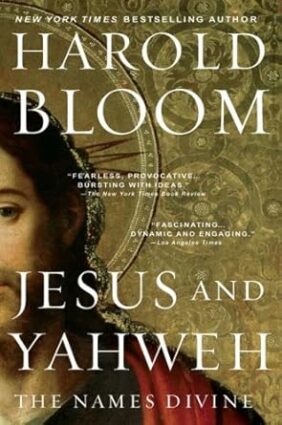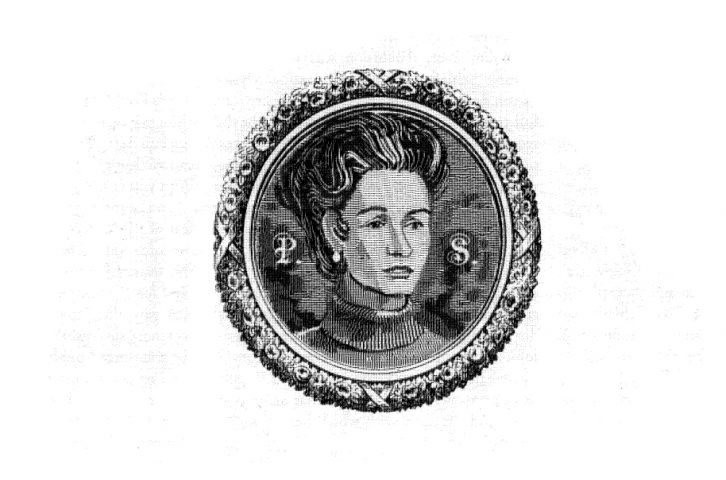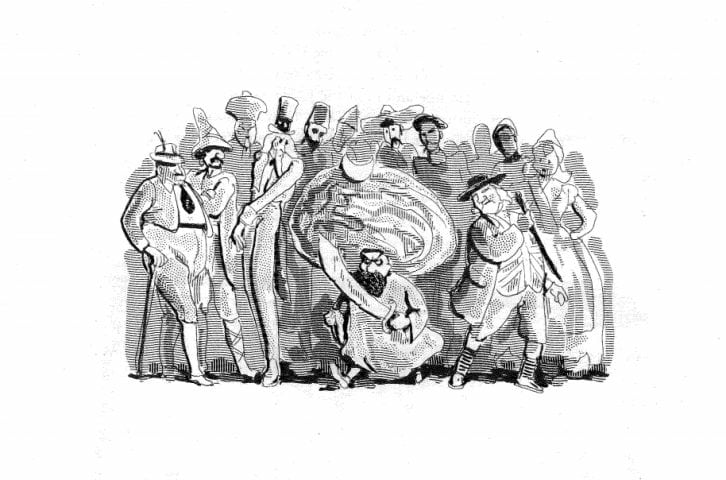Books Reviewed
Harold Bloom, the 75-year-old one-man humanities department at Yale, has some 30 books under his belt, but the latest is in style and substance the most Bloomian yet. Jesus and Yahweh turns out to be as much about Bloom as it is about the Hebrew and Greek Bibles and their divine protagonists.
The book brims with his characteristic stylistic brew, a blend of encyclopedic fluency and flippancy. Unseasoned by anything modest, tentative, or cautious, the main ingredients, as before, are the witty, whimsical, freewheeling asides—some pure brilliance, some brilliance generously mixed with bombast, and all designed to épater les fidèles.
The new book also extends some of Bloom’s characteristic insights. It takes from The Anxiety of Influence (1973), his theory of poetic influence, the idea that literary revision is a form of deliberate misreading, or “misprision.” Later poets are thrust into the condition of “belatedness,” envious inheritors seeking to displace their overwhelmingly powerful predecessors. In Jesus and Yahweh, Bloom translates his theory from poetic to sacred texts, which for Bloom is no translation at all. As he puts it in the earlier volume: “The distinction between sacred and secular texts results from social and political decisions, and thus is not a literary distinction at all.”
It might be said that each of Bloom’s successive books revises his original insight, which would explain why he so often seems to be paraphrasing himself. From Kabbalah and Criticism (1975), the new book borrows the claim that the kabbalists, in struggling to introduce a totally new religious impulse into an old tradition, founded “the classic paradigm upon which Western revisionism in all areas was to model itself ever since.” From The Book of J (1990), Bloom’s attempt to show that the Bible’s so-called J author (or Yahwist) was an aristocratic 10th-century B.C. woman, it lifts the insistence on treating the Biblical God as an all-too-human figure. Much of the vocabulary used here to describe this figure, finally, is furnished from Shakespeare: The Invention of the Human (1998), as when the new book describes Yahweh as combining “Lear’s unpredictable furies, Falstaff’s surging vitalism, and Hamlet’s restlessness of consciousness.”
And yet despite the familiar moves, their culmination in Jesus and Yahweh is carried off to very surprising effect. The first revelation is that Bloom’s ideas about the Jewish and Christian scriptures inspired his theory of literary influence, and not vice-versa. This is true first of all in the chronological sense. Bloom reports that he first read the Gospels in Yiddish; the first book he owned as a child was a Yiddish translation of the New Testament, brought by a missionary to his house in the East Bronx. (His parents never learned to read or speak English.) Telling us that he has been thinking about the friction between the two Bibles from the very beginning of his career, Bloom mentions that The Anxiety of Influenceoriginally included a large section on the Scriptures, later excised.
The revelation about the direction of inspiration is true in a deeper sense, too. At the heart of Jesus and Yahweh lies the argument that the Hebrew Bible-New Testament rivalry is not just another example of the anxiety of influence, but its ultimate expression. The Greek Bible—Bloom calls it the Belated Testament—is “obsessed with its anxious relationship to the Law and the Prophets, and seeks to resolve a complex anguish resulting from that overwhelming influence, by the strongest and most successful creative misreading in all of textual history.” The Christian misreaders sought to put the Hebrew Bible into “textual slavery” by reordering it and taking it as a prefiguration of the New Testament. To do so, Bloom says, they had to be “superbly gifted in the arts of usurpation, reversal, and appropriation.”
But the massive appropriation was made necessary precisely by the overwhelming literary strength these writers confronted. “The aesthetic dignity of the Hebrew Bible,” Bloom writes, “is simply beyond the competitive range of the New Testament…. In the aesthetic warfare between the Hebrew Bible and the New Testament, there is just no contest.” (Bloom had already told us in A Map of Misreading [1975] that he preferred the Hebrew Bible to Homer.)
This in itself is not a new observation. Nietzsche declared: “To have glued this New Testament, a kind of rococo of taste in every respect, on to the Old Testament to make one book, as the ‘Bible,’ as ‘the book par excellence’—that is perhaps the greatest audacity and ‘sin against the spirit’ that literary Europe has on its conscience.”
But the idea, at least in its elaborated form, is new in Bloom, and it brings us to the book’s second revelation: his attitude toward Christianity. In a delightful 1979 essay, Cynthia Ozick accused Bloom, the self-proclaimed Gnostic Jew, of “idol-making,” and of “artistic anti-Judaism.” But in his latest book, Bloom evinces both a surprising Jewishness—”my Orthodox Judaic childhood lingers in me as an awe of Yahweh”—and a startling anti-Christianity. If Jesus and Yahweh is right, Christians misread not only Yahweh, but Jesus, too—and they are polytheists to boot.
Beyond the fact that the historical Jesus was “the Jew-of-Jews, the Jew proper,” he remains unknowable beneath the seven irreconcilable versions of him presented in the New Testament; he is “a concave mirror, where what we see are all the distortions each of us has become.” Bloom reminds us that “there are no verifiable facts about Jesus of Nazareth…. There is not a sentence concerning Jesus in the entire New Testament composed by anyone who ever had met the unwilling King of the Jews.” This did not prevent Christians from turning him into a theological entity: Jesus Christ, the Son of God, is according to Bloom “totally smothered beneath the massive superstructure of historical theology.”
Bloom interprets the trinity as an essentially polytheistic “structure of anxiety” in which God the Father—whom Bloom finds “lacking in personality”—is a mere shade of Yahweh. Yahweh, “the West’s major literary, spiritual, and ideological character,” has not, according to Bloom, “survived in Christianity.” In J’s portrait—the earliest biblical layer—Yahweh is “anxious, pugnacious, aggressive, ambivalent,” not to mention all too often absent. But unlike Jesus Christ and God the Father, he is emphatically not a theological God. Indeed, Bloom asserts that “no God has been more human.”
* * *
Bloom’s insistence on the irreconcilability between Yahweh and his New Testament successors—deeper even than the irreconcilability between, say, the Gospel of Mark’s Jesus and the Gospel of John’s Jesus—is important for two reasons. First, it entails, as the title of the book’s penultimate chapter puts it, “the irreconcilability of Christianity and Judaism.” Here Bloom claims that any notion of a Judeo-Christian tradition is a myth, while “‘Christian-Jewish dialogue’ isn’t even a myth, but invariably farce.” This is so, he says, because “Greek theological formulations and Hebraic experiential memories simply are antithetical to each other.” (Bloom is given to sweeping pronouncements of irreconcilability. In Where Shall Wisdom Be Found? [2004], he relates that Allan Bloom gave him a copy of his translation of Plato’s Republic with the inscription: “For Harold—Hoping for a reconciliation between Athens and Jerusalem.” Harold replied that there can be no such resolution, since “what Isaiah is doing and what Socrates and Plato are doing are totally antithetical.”)
Second, the gap between the two divinities amounts for Bloom to a demonstration that contrary to conventional wisdom, the religion we today call Judaism is not Christianity’s parent. “Rather, Judaism and Christianity are enemy brothers, both stemming from Second Temple Judahisms [sic].”
Because Bloom is principally an imaginative reader, reading him often requires tolerating discursiveness and digression as the price of the ingenious leaps that take him beyond existing modes of literary or biblical criticism. Sometimes these digressions fall into opacity. In two chapters called “Self-Exile of Yahweh,” and “Yahweh’s Psychology,” for instance, Bloom indulges in bewildering kabbalistic talk of Yahweh’s “tripartite consciousness of being,” divine sparks, and zimzum, the Hebrew term for the process by which Yahweh “multiplies by contraction.”
On other occasions, Bloom’s digressions merely distract. For instance, he devotes one of the book’s longer quotations to Leo Strauss, whom he disparages, sparing no cliché, as the “oracle of the neocons who persuaded George W. Bush to launch his Baghdad Crusade.” In a recent interview in Il Foglio with Amy K. Rosenthal, Bloom qualified his judgment:
Yes, I wrote this, but that doesn’t mean that Leo, whom I knew and who was a great scholar, is responsible for his students and his students’ students. Leo Strauss was a great Jewish sage…. Leo on Spinoza was magnificent. His book on persecution and the art of writing is stupendous and of what Leo called ‘writing between the lines and reading between the lines’—all of that was quite magnificent and has nothing whatsoever to do with the absurd political usage to which he is being put. In fact, most of what the neocons took from Leo came out of Thoughts on Machiavelli, which is a brilliant book and which I think they are rather weakly misreading.
More troublingly, however, Bloom sometimes asks us to tolerate not digression but an imprecision so thick that it threatens to deflect his argument. There is no doubt that the New Testament can fruitfully be read as a belated but strong misreading of its predecessor. But as we’ve seen, Bloom argues his way from that observation of Oedipal misprision to a claim about the irreconcilability of the two scriptures and the divine characters they present. But this conflates rivalry with irreconcilability. Are not most rivalrous sons all the more strongly attached to their fathers precisely by rivalry’s passions?
From there, in turn, Bloom deduces his denial of Judaism’s parentage of Christianity. But this reduces religions to their sacred texts. Bloom acts as if literary irreconcilability entailed historical irreconcilability. Despite the chasm separating their foundational texts—a gulf he maps expertly—Judaism and Christianity have, as a matter of historical fact, had quite a lot to do with one another. More deeply, however, Bloom’s discussion of Yahweh, Jesus, and God the Father rests on the claim that we cannot encounter these figures apart from the texts that record their teachings and actions; in other words, Bloom assumes that we encounter them in the same way we approach Lear. In assuming that the divine—Jewish or Christian—has no existence apart from the text, Bloom evinces a curious inability to conceive of non-textual religious encounters. In the end, he turns out to be a reader par excellence, but also perhaps merely a reader.
This can be put another way. In Jesus and Yahweh, Bloom recalls Kafka’s remark that Freud was (referring to the greatest of Jewish Biblical commentators) the Rashi of contemporary anxieties. We might say that Harold Bloom is the Rashi of misreadings, a kind of contemporary sage who, due perhaps to the excesses of reading itself, himself misreads—sometimes forcefully, sometimes weakly.
In one of the chapters on the kabbalah with which he draws his book to a close, Bloom invokes Gershom Scholem, the matchless scholar of Jewish mysticism, as one of “the prophets of Judaism” he most wholeheartedly accepts. The prophet, as it happens, had something to say about Bloom. Reacting to a 1975 essay that Bloom had devoted to Scholem, the latter wrote: “I found many sentences quite remarkable and worth considering. He certainly read me with an imaginative mind.” Applied to the present book, that judgment seems to strike just the right note.




